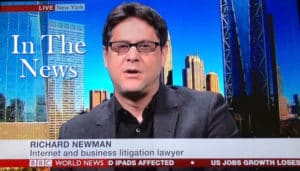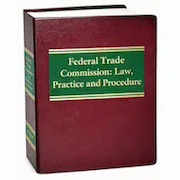Ad Law Insights - Legal and Regulatory Updates
FTC + state attorneys general digital marketing compliance, investigation + enforcement advocacy by FTC lawyer to Internet business community
This website is brought to you by Hinch Newman LLP and FTCDefenseLawyer.com.



AI-generated advertisements are a double-edged sword. Digital marketers should be properly advised on risks related to such use in conjunction with advertising campaigns.
For example, the growing use of artificial intelligence in advertising has recently resulted in New York State enacting a new law that carries clear compliance obligations and monetary penalties for advertisers that fail to comply.
On December 11, 2025, New York Governor Kathy Hochul signed S.8420-A/A.8887-B, a first-of-its-kind legislation. The new law requires transparency in digital and social advertising. In short, the new law requires a “conspicuous disclosure” when an advertisement includes a “synthetic performer” in a commercial advertisement.
What is a “Synthetic Performer”?
As set forth by the statute, a “synthetic performer” means a digitally created asset created, reproduced, or modified by computer, using generative artificial intelligence or a software algorithm, that is intended to create the impression that the asset is engaging in an audiovisual and/or visual performance of a human performer who is not recognizable as any identifiable natural performer.
What are the Disclosure Requirements Under the New Law?
Any person, firm, corporation, or association (or their agents or employees) engaged in the business of dealing in any property or service who for any commercial purpose produces or creates an advertisement before the public in New York respecting any such property or service, in any medium or media in which such advertisement appears, shall “conspicuously” disclose in such advertisement that a synthetic performer is in such advertisement, where such person has actual knowledge that a synthetic performer is used.
As previously covered here and here, in March 2025 the Office of the Attorney General for the State of New York introduced the Fostering Affordability and Integrity Through Reasonable (“FAIR”) Business Practices Act in the State Senate and State Assembly. The proposed legislation is intended to revise Article 22-A of New York’s General Business Law.
The FAIR Business Practices Act passed the State Legislature in June 2025.
On December 20, 2025, New York Governor Kathy Hochul officially announced the signing of the historic consumer protection law. The legislation expands and strengthens New York’s primary consumer protection law, GBL §349, for the first time in 45 years. The new law now protects New Yorkers from unfair, abusive, and deceptive business practices.
“The FAIR Business Practices Act will help us tackle rising costs and protect working families and small businesses,” said Attorney General James. “I am proud to have worked alongside Senator Comrie and Assemblymember Lasher to update our most important consumer protection law for the first time in 45 years to stop predatory lenders, abusive debt collectors, dishonest mortgage servicers, and so much more. At a time when the federal government is abandoning working people and raising the cost of living, this law will help us stop companies from taking advantage of New Yorkers. I thank Governor Hochul, Senate Majority Leader Stewart-Cousins, and Assembly Speaker Heastie for their leadership and look forward to working together to make our state more affordable.”
“I commend the Governor and Attorney General James for advancing the FAIR Business Practices Act,
On December 3, 2025, the Federal Trade Commission announced that it has given final approval to an order against a telemedicine company and its principals, requiring them to stop the alleged deceptive advertising of weight-loss programs and to stop the alleged use of deceptive and unfair billing and cancellation practices.
In its July 2025 complaint, the FTC alleged that the company and certain individuals associated therewith “exploited skyrocketing interest in prescription glucagon-like peptide 1 agonist (GLP-1) weight-loss drugs like and Ozempic.” FTC lawyers also alleged they sold weight-loss programs with undisclosed costs and membership commitments, made unsubstantiated claims about the weight loss achieved by their clients, used fake testimonials, and unfairly distorted consumer reviews.
According to the FTC, the firm and its principals also allegedly failed to process cancellation and refund requests in a timely manner and failed to obtain express informed consent before charging consumers or making recurring debits, according to the complaint.
The final order requires the foregoing parties to pay $150,000, which is expected to be used to provide refunds to consumers.
The final order also:
- prohibits them from misrepresenting the cost of telehealth services;
- requires competent and reliable evidence to support claims about the average or typical results users will achieve;
- prohibits misrepresentations that reviews are truthful or from real consumers, and requires disclosure of any unexpected material connection with endorsers or reviewers;
- prohibits manipulation of reviews;
The Federal Trade Commission and National Advertising Division of BBB National Programs set forth their enforcement priorities during the 2025 ANA Masters of Advertising Law Conference,
Not surprisingly, the FTC set forth a bread-and-butter enforcement agency. It includes, without limitation, protecting children (Children’s Online Protection Act (16 C.F.R. § 312); enforcing Made in USA (U.S. Origin Claims) (Made in USA Labeling Rule – 16 C.F.R. § 323); enforcing subscriptions, negative options and automatic trial programs (Restore Online Shoppers’ Confidence Act), Dark Patterns and Click-to-Cancel); Enforcing the FTC Rule on Unfair or Deceptive Fees”); enforcing target advertising and surveillance marketing techniques; enforcing influencers, consumer reviews and endorsements (The Consumer Reviews and Testimonials Rule: Questions and Answers – 16 CFR Part 465); and enforcing the use of AI (for example and without limitation, exaggerating the capabilities of AI features).
Consult with an experienced ecommerce attorney to discuss the implementation of preventative compliance measures or if you are the subject of a regulatory investigation of enforcement action.
Other areas which are reasonably certain to receive increase regulatory investigation and enforcement attention include but are not limited to, data privacy, Telephone Sale Rule, Telephone Consumer Protection Act, state unfair and deceptive business practices,
Additional key highlights and takeaways for discussion with a qualified ecommerce attorney include the use of health claims, green claims, and social media IP rights and takedown procedures,
Contact the author for more information.
Richard B.
In November 2025, the Office of the Pennsylvania Attorney announced a $750,000 settlement with a collectibles company regarding its “negative option features” and other business practices.
According to an Office of Attorney General investigation that involved more than 200 consumer complaints, it was determined that the company allegedly advertised collectibles and engaged in sales that resulted in consumers not realizing they were enrolled in subscription services — a practice referred to as a negative option feature.
Consumers then had short windows to return goods they were charged for as part of the subscription plan, according to the PA OAG.
Under the settlement terms, the company agreed to pay $750,000 to allegedly harmed consumers, end subscription plans and collections efforts with nearly 200,000 customers, and revise its business and advertising practices.
“Negative option features are a breach of state consumer laws as they are deceptive practices designed to enroll consumers into future purchases,” the Attorney General said. “This settlement will make many consumers whole while requiring the company to change its practices and refrain from negative option features. When buying any products, be sure to read the terms and conditions thoroughly before committing to that purchase.”
According to the OAG, the company advertises and sells collectible merchandise, mostly collectible coins, via direct mail, over the phone, through print advertisements, and through the company website.
Originally, it was alleged that the company was in violation of the Pennsylvania Unfair Trade Practices and Consumer Protection Law.
Topics
Archives
About This Blog and Hinch Newman’s Advertising + Marketing Practice
Hinch Newman LLP’s advertising and marketing practice includes two decades successfully resolving some of the highest-profile Federal Trade Commission (FTC) and state attorneys general digital advertising and telemarketing investigations and enforcement actions. The firm possesses superior knowledge and deep legal advocacy experience in the areas of advertising, marketing, lead generation, promotions, e-commerce, privacy and intellectual property law. It has also been selected to author the Consumer Protection Section of the prestigious American Lawyer Media International Federal Trade Commission: Law, Practice and Procedure Treatise, a comprehensive resource for developments of concern to advertisers, marketers and legal professionals that practice before the Commission. Through these advertising and marketing law updates, Hinch Newman LLP provides commentary, news and analysis on issues and trends concerning developments of interest to digital marketers, including FTC and state attorneys general advertising compliance, civil investigative demands (CIDs), and administrative/ judicial process.
